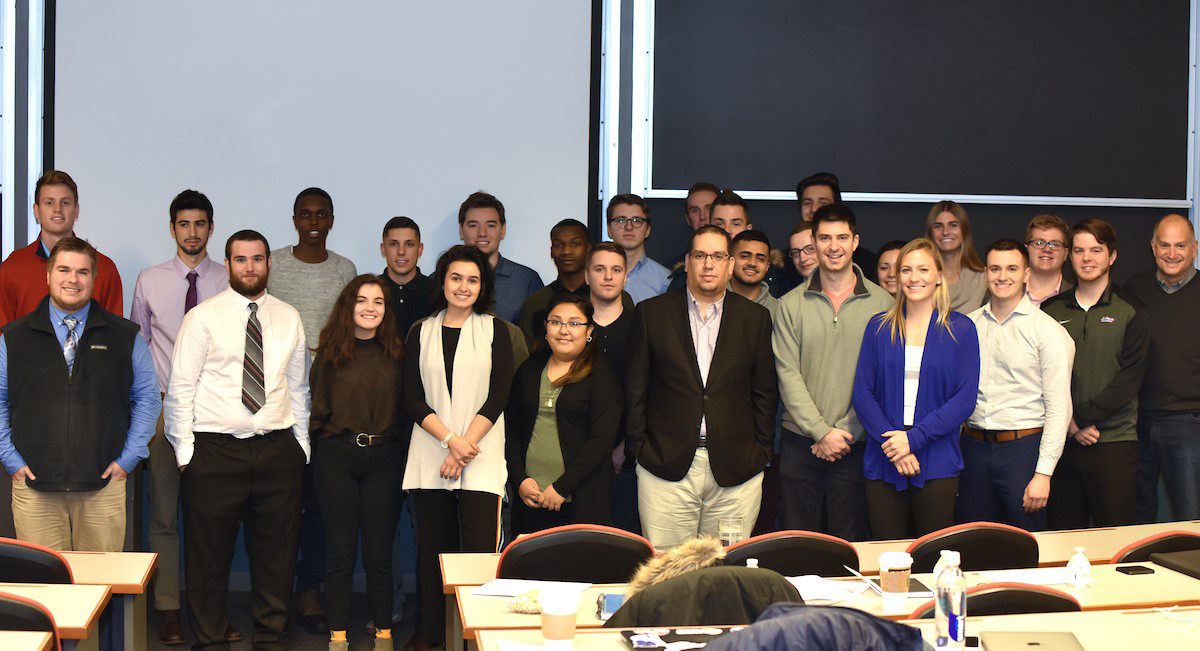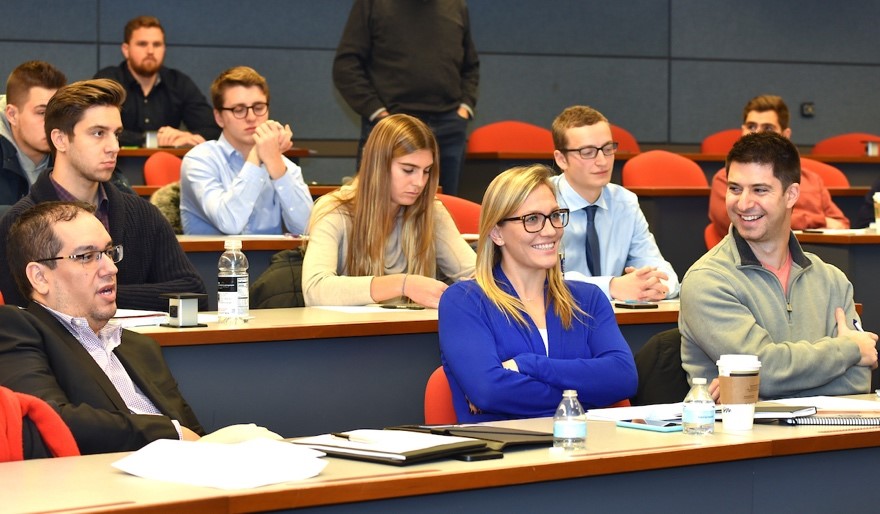 Students in the Introduction to Sports Management course, taught by Senior Instructor Andy Clark, pose for a photo before delivering presentations. | Photo courtesy of Gina Ciolli
Students in the Introduction to Sports Management course, taught by Senior Instructor Andy Clark, pose for a photo before delivering presentations. | Photo courtesy of Gina Ciolli
The world of sports has the ability to better a community through programs and initiatives that put wins and losses aside for a greater purpose. Families facing economic hardship during the holidays or local school kids who cannot afford lunch can have these weights lifted off them through the philanthropic services of the athletic icons in their city. These acts of service may seem to be fleeting, but the memory of them can last years afterwards.
These acts are what we were tasked to highlight in DePaul's Driehaus College of Business Introduction to Sports Management course in the fall quarter. Our student team project aimed at exploring corporate social responsibility (CSR) among a broad range of categories related to sports. The class was filled with passionate students eager to learn as budding professionals in the industry that we have been a part of as young fans.
Taught by Sports Management Program Director Andy Clark, the course featured guest lectures by leaders from different areas of the sports industry who offered insight into what they do and how we can get started in the business. The sports philanthropy student team project incorporated many of the concepts we learned throughout the quarter.
To launch the project, our class was introduced to
Philanthropy Playmakers, which “advises athletes and sports organizations on how to leverage sports to accelerate community impact." Philanthropy Playmakers co-founders Eric Shainock and Erica Prosser helped design our project and attended multiple class sessions throughout the quarter to consult and advise each team.
Students were arranged into seven teams that focused on athletes, teams, leagues, legacy events, esports, sports non-profits and brands. Throughout the quarter, each team conducted extensive research on their topics to understand CSR best practices in their discipline. Through interviews and research, each team developed innovative ideas to drive philanthropy in sports forward. These insights helped us develop our own original CSR program.
 The judging panel for the student sports philanthropy team project presentations (front row from the left): Tony Rokita, Erica Prosser and Eric Shainock. | Photo by Kathy Hillegonds
The judging panel for the student sports philanthropy team project presentations (front row from the left): Tony Rokita, Erica Prosser and Eric Shainock. | Photo by Kathy Hillegonds
The project culminated with final presentations to a panel comprised of Prosser, Shainock and DePaul alumnus Tony Rokita, director of alumni relations for the Chicago Bulls. In addition to providing feedback to each team, Rokita shared a story about Bulls legend Michael Jordan meeting with a Make-A-Wish Foundation-supported child with cancer before a game. The conversation the two had was a brief moment in which the child sat up in his bed and exhibited a new found energy he had lost during his battle with cancer. His family was greatly affected by this moment, as was Rokita who says it has stuck with him in the more than 20 years since and showed him the impact sports can have during difficult times.
Our team's topic was legacy events. From Super Bowls to All-Star Games to the Olympics, these events evoke immense passion and civic pride. It is an honor for a city to host one of these events whether it is their first or their sixth time, but with hosting such a large event comes a greater responsibility to leave a lasting legacy for the surrounding community. My team focused on the 2028 Olympic Games in Los Angeles and the many events leading up to the games. Our focus was on sustainable efforts to reduce a negative impact on the environment through implementing green practices and ways to benefit the homeless population in the city. One of our original ideas for the 2028 Games was to partner with Tesla to offer a sustainable transportation system in the city. This topic offered a unique approach to the project as legacy events can hold a larger impact for the athletes and fans.
Each project succeeded in finding what makes sports so special as an impactful tool for change in society and it was interesting to see shifts in perspective with every new topic. Following the presentations, Eric Shainock shared: “Erica and I were thrilled to work with DePaul to develop a sports philanthropy project for the class. After external interviews and extensive research, the students delivered final presentations that exceeded our expectations. They really took ownership of the project and provided insights that could very well be implemented within the sports philanthropy industry right now. We were proud to be and expose future sports business leaders to an emerging and critically important sector of the sports industry."
People love sports for the camaraderie, the excitement and just for the plain fun of it. The world of sports has a unique ability to benefit communities, raise money for organizations, bring attention to important issues and provide opportunities for people in ways that other industries cannot do, all while fans cheer on their favorite teams.
Records will always be broken and teams will always chase championships, but sports philanthropy continues to develop as an important “teammate" to the efforts of those in the industry to help others. This project established the great importance of CSR in sports and helped us, as budding professionals, to understand the multi-dimensional industry beyond statistics and league standings.
Gina Ciolli is a sports communications major at DePaul.
Learn more about: